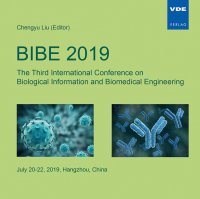Change of Lactobacillus and Bifidobacteria genera from breast milk to elders and their potential for preserving human health
Conference: BIBE 2019 - The Third International Conference on Biological Information and Biomedical Engineering
06/20/2019 - 06/22/2019 at Hangzhou, China
Proceedings: BIBE 2019
Pages: 6Language: englishTyp: PDF
Personal VDE Members are entitled to a 10% discount on this title
Authors:
Li, Na; Zhao, Xixi; Zhao, Haobin; Riaz Rajokaa, Muhammad Shahid; Shi, Junling (Key Laboratory for Space Bioscience and Biotechnology, School of Life Sciences, Northwestern Polytechnical, University, Xi’an, Shaanxi Province, China)
Abstract:
Since the discovery of the relationship between gut microbiota, human health, diseases protection, and disease cure, the development of highly efficient probiotics has become a hot research topic among food and medical scientists. Lactobacillus and Bifidobacterium are gut microorganisms that have been reported to be beneficial for human health and are therefore widely used as probiotics. However, little is known about the development of these bacteria in the gut during a human life. This article analyzed the reported results for these two genera and for different stages of human life. Six Lactobacillus species (L. rhamnosus, L. crispatus, L. gasseri, L salivarius, L. paracasei, and L. fermentum) were found to travel from breast milk to the infants’ gut. Except for L. rhamnosus, which disappeared in adults, the other five Lactobacillus species remained in the gut through the development (baby, adult, and elders). Two Bifidobacterium species (B. breve and B. longum) start from breast milk and remained in the gut throughout the whole life. L. coryniformis was only found in breast milk, B. infantis was only found in the baby intestinal, while L. johnsonii was specific for elders. L. reuteri, L. brevis, and L. plantarum start at the baby gut, while L. acidophilus, L. delbrueckii, L. helvetisu, L. casei, L. sakei, and L. curvatus start in adults and remained in the gut the rest of life. The functions and potential of Lactobacillus and Bifidobacteria species isolated from breast milk were also analyzed according to the current reports. The results indicate that breast milk could be developed as an important source of probiotics. The results provide important information for the functional enrichment of formula milk powder for babies with respect to probiotics in addition to nutrition.


